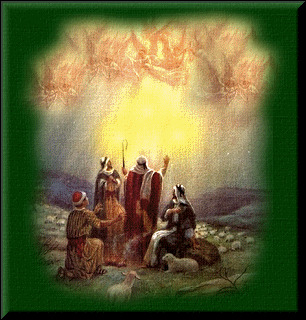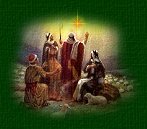|



Go Tell It On
The Mountains
By the Rev. Lee Woofenden
Bridgewater, Massachusetts, December 26, 1999
Advent Celebration
Readings

Isaiah 52:7-15 How beautiful upon the mountains
How
beautiful on the mountains are the feet of those who bring
good news, who proclaim peace, who bring good tidings, who
proclaim salvation, who say to Zion, "Your God
reigns!" Listen! Your watchmen lift up their voices;
together they shout for joy. When the Lord returns to Zion,
they will see it with their own eyes. Burst into songs of
joy together, you ruins of Jerusalem, for the Lord has
comforted his people, he has redeemed Jerusalem. The Lord
will lay bare his holy arm in the sight of all the nations,
and all the ends of the earth will see the salvation of our
God.
Depart,
depart, go out from there! Touch no unclean thing! Come out
from it and be pure, you who carry the vessels of the Lord.
But you will not leave in haste or go in flight; for the
Lord will go before you, the God of Israel will be your rear
guard.
See,
my servant will act wisely; he will be raised and lifted up
and highly exalted. Just as there were many who were
appalled at him--his appearance was so disfigured beyond
that of any man and his form marred beyond human
likeness--so will he sprinkle many nations, and kings will
shut their mouths because of him. For what they were not
told, they will see, and what they have not heard, they will
understand.

Matthew 18-23 The birth of Jesus
The
birth of Jesus the Christ took place in this way: When his
mother Mary had been engaged to Joseph, but before they came
together, she was found to be with child from the Holy
Spirit. Her husband Joseph, being a righteous man, and
unwilling to expose her to public disgrace, planned to
dismiss her quietly.
But
just when he had resolved to do this, an angel of the Lord
appeared to him in a dream and said, "Joseph, son of
David, do not be afraid to take Mary as your wife; for the
child conceived in her is from the Holy Spirit. She will
bear a son, and you are to name him Jesus, for he will save
his people from their sins."
All
this took place to fulfill what had been spoken by the Lord
through the prophet, "Behold, a virgin will conceive
and bear a son, and they will name him Emmanuel," which
means, "God with us."

Matthew 17:1- 8 The transfiguration of Jesus
After
six days Jesus took with him Peter, James, and John the
brother of James, and led them up a high mountain by
themselves. There he was transfigured before them. His face
shone like the sun, and his clothes became as white as the
light. Just then there appeared before them Moses and
Elijah, talking with Jesus.
Peter
said to Jesus, "Lord, it is good for us to be here. If
you wish, I will put up three shelters--one for you, one for
Moses, and one for Elijah."
While
he was still speaking, a bright cloud enveloped them, and a
voice from the cloud said, "This is my beloved Son,
with whom I am well pleased. Listen to him!"
When
the disciples heard this, they fell face down to the ground,
overcome with fear. But Jesus came and touched them, saying
"Get up and do not be afraid." When they looked
up, they saw no one except Jesus.

Arcana Coelestia #6435.15 Mountains and hills
"Mountains
and hills" mean different kinds of heavenly and
spiritual love, since they are places that rise up above the
earth, and places that rise up high symbolize things that
relate to heaven--and in the highest sense, things that
relate to the Lord. "The land of Canaan" means the
Lord's heavenly kingdom, so everything in that land has a
spiritual meaning--its mountains and hills meaning the kinds
of things that are high. For when the most ancient people,
who belonged to the heavenly church, went up a mountain, the
idea of height came to mind, and from height, the idea of
what was holy, since Jehovah or the Lord was said to live in
the most high places, and also because in the spiritual
sense "height" means the goodness of love.

Sermon
How
beautiful on the mountains are the feet of those who bring
good news, who proclaim peace, who bring good tidings, who
proclaim salvation, who say to Zion, "Your God
reigns!" (Isaiah 52:7)
I
can't resist repeating a conversation that took place in the
car yesterday afternoon as we were driving toward our second
Christmas at my parents' place. Chris (4) spoke up and said,
"Christmas is not just about toys. It's about
love." Caleb (almost 3) quickly added "and
presents!" Chris persisted: "No, it's not just
about presents, it's about love." Caleb, always ready
with an answer, came back with, "I love to open
presents."
That
just about sums up both the beauty and the paradox of
Christmas. Christmas is about love--and about
presents. And for all our hand-wringing about
over-commercializing Christmas, spending too much on stuff,
and so on, underneath it all even the presents are about
love. The wise men from the East brought the baby Jesus
presents of gold, frankincense, and myrrh. And though our
modern Christmas gift-giving is a relatively recent
Christmas tradition, it does have those Biblical roots from
Matthew's account of Jesus' birth.
Perhaps
we do sometimes go overboard on the material side of
Christmas. However, I believe that even this is a result of
our searching for love, and for ways to express our love to
one another. Paradoxically, in our culture it seems that
when we have a hard time expressing our love to one another
directly, we often go even more strongly toward using
material things--gifts--as messengers of our love.
This
year, with Christmas on a Saturday, our family celebrations
are bracketed on both sides by church services. This gives
us a perfect opportunity to lift our minds and hearts above
the material side of Christmas and remember the source of
all our family celebrations: the love of God that is shown
to us in the best gift of all: the birth of the Lord Jesus.
That
is what today's readings are all about. And the hymn that we
just sang echoes those stories:
Go,
tell it on the mountains,
Over the hills and everywhere;
Go tell it on the mountains,
Our Jesus Christ is born.
Swedenborg
helps us to understand what this is all about when he tells
us that the high places of mountains and hills correspond to
the inner high places of heavenly and spiritual love. In
another place, he tells us how angels and spirits relate to
mountains and hills:
"Mountains"
symbolize heaven, so they symbolize the goodness of love.
This meaning comes from the other life. Mountains, hills,
rocks, valleys, and many other things appear there just as
on earth. And on the mountains there are people who live
in heavenly love, on the hills those who live in spiritual
love, on the rocks those who live in faith, and in the
valleys those who have not yet been lifted up to the
goodness of love and faith. . . . Because
these things appear in the other life and symbolize these
realities, they have the same meaning in the Bible. (Arcana
Coelestia #10438)
Here's
a translation of what Swedenborg is saying: People and
angels who live in "heavenly (or celestial) love"
are those who love the Lord above all else--who have the
Lord not just in their minds, but in their hearts, and are
moved by that love to love everyone around them, deeply and
fully. This state of being is the mountain height of human
life.
People
and angels who are in "spiritual love" are those
who put the neighbor--other people--first. Their love tends
not to be centered quite as much in their heart as in their
head, which tells them that loving others is the way to have
happiness among all people. The Lord is present in them as
well, but not quite as fully and consciously. These uplifted
hills of mutual concern and love are where many of us live
in our better moments, in which we can think of others
first, an ourselves afterwards.
We
have all experienced the rocks of the kind of faith that
does not put love first. Those who say that it is what we believe
that saves us, and not the way we live, can become
very dogmatic about their faith. Sometimes when they are
"witnessing" to us, we feel more like we're having
rocks thrown at us than that we're having the Lord's love
expressed to us. And I think that if we are honest, we'll
all admit that sometimes we approach one another with hard
heads rather than with open hearts.
The
valleys are where we live when we haven't yet gotten the
idea that it is love and faith that make life truly human
and truly worth living. When we think that Christmas is only
about presents, and do not realize that behind all the
material trappings there is a love that runs deeper than
anything we can ever imagine, then we are stuck in the
spiritual valleys of materialism. Our deeper and higher
selves are undeveloped--yet waiting to be born.
The
Christmas story helps to guide us out of the valleys of
worldliness and up onto the mountains of love. Three of
Jesus' disciples, Peter, James, and John, had a tremendous
experience of the true meaning of the mountain of the Lord's
love. Having been with him in the ordinary valleys of human
experience, they went up the mountain with him and saw
something of the glory of the Lord, which was unseen within
him all along. There, on the mountain, "he was
transfigured before them. His face shone like the sun, and
his clothes became as white as the light." And the
words they heard from above tell us something of the meaning
of this transfiguration: "This is my beloved Son, with
whom I am well pleased. Listen to him!"
This
glorious Jesus they were experiencing with their spiritual
eyes opened is the same Jesus who was born so simply and
quietly on that first Christmas. When our minds are running
in their common, everyday paths, we may not realize what
depths of love and wisdom were and are present in that
divine being who has been born to us.
When
we do raise our minds up to the mountains of God's love,
then we can also see with the eyes of our minds and hearts
what the disciples saw. We can see Jesus of Nazareth
transformed into Immanuel: God With Us. We can feel the
warmth and light of the spiritual sun--the warmth of love
and the light of enlightenment--shining within us. We can
feel the Lord warming us from the inside out, and moving us
to show to one another the same love that he shows to us. We
can feel the brilliant light of the Lord shining through his
words and his teachings, showing us how to express this love
to one another.
When
we raise our minds above the valleys of the material side of
Christmas, then we can know the true and deep joy of the
Gospel according to Christopher: Christmas is not just about
toys. It's about love. Amen.

 


|